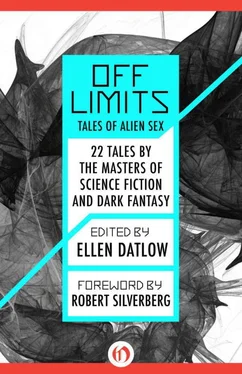Boyd climbed into the driver’s seat and slammed shut his door. The automobile was intact now, enclosing a perfect bubble of space and heat. The automobile started to move.
“I’ve been through this before,” Boyd assured her. Mist thickened on the windshield and Boyd activated the wipers. “A piece of cake, really. It’s all in the breathing. My first wife Betty, she panicked, couldn’t breathe. Then they injected her with a sedative and bang. As soon as she stopped thinking, she breathed perfectly.”
They were passing through streets lined with overturned garbage cans. City lights were everywhere. They just didn’t seem to reveal anything.
“Why didn’t you tell me before?” Harriet asked. “Why did I have to wait so long?”
“I’m sorry, babe.” Boyd was gazing abstractly out the window, computing logistical distances, road conditions, those soft rear tires that needed replacing. “Why didn’t I tell you what?”
“Can I ask questions?” Harriet asked the smooth white lights wheeling through the car. “Or am I just supposed to listen?”
The hospital was surrounded by brightly illuminated gray parking lots, like some neglected outdoor cinema. The doors to the emergency room opened automatically, and Boyd helped Harriet into a wheelchair. “I called ahead,” Boyd told her, “and alerted Dr. Wilde. Don’t be frightened. If you need anything, all you have to do is ask.”
There was something in the silence behind Boyd’s voice Harriet wanted to hear.
And then, with a long sustained gasp, Harriet felt her body start to breathe.
“Je- sus ,” Harriet said. “Je- sus .”
Everything speeded up. Harriet was being conveyed down long corridors, and then transferred to a tissue-lined examination table. She reached out. She was holding someone. She pulled the hands closer, closer.
“Tell me,” she said. “Tell me, tell me.”
“It’s okay, baby. They’ve gone for the doctor. Looks like you’re not going to make anybody wait around, are you? I’ve told them to give you something for the pain—”
The entire room clenched around her, and she felt the deepness of her body exerting pressure back. “No,” Harriet told him, “no, don’t, no, no,” without even listening, without trying to decipher what Boyd’s words meant.
Then she felt two enormous hands come down, grip her by the waist and lift her up off the table.
“Je- sus ,” she said. “Je-sus.”
Her body seemed very far away. She was connected to her own sensations by a long, microscopic filament of light.
”Tell me,” she said. “Tell me, tell me, tell me, tell me.”
“Tell you what, honey? You keep asking that. Tell you what? I’m listening, honey.”
“Don’t,” Harriet told his hands. She was trying to reach into the light’s white canvas, the pure white soundless texture that once filled her mother’s apartment with everything Harriet couldn’t be. She thought she saw Boyd, but it wasn’t, wasn’t him, because Boyd didn’t matter, Boyd had never really been. Then she saw him, the man with the voice looking down at her, understanding how she felt and what she needed, loving her for all the right reasons. She could see him but she couldn’t see him. He was there and he wasn’t there.
It doesn’t make things any easier, the voice told her. Even when you know, it doesn’t make you happy.
“I understand,” Harriet said, “it doesn’t matter, I don’t need to be happy, tell me, tell me, I really will understand.” Harriet was crying. Exultation filled her with heat and oxygen and light. “This,” Harriet cried, “is just perfect, ” and then the hands came swinging down again and struck iron through her stomach, her pelvis, and spine and lifted, lifted her off the table, up through the wide bright air and soft, impactless white glare of the ceiling. Nobody ever told her but now she knew, she knew. She was hurtling through the white air, the bellows of her lungs beating and swallowing at the rough pale atmosphere like an engine, and nobody had to tell her anything ever again because finally she knew, she knew, she knew, she knew.
Queen of the Apocalypse
Scott Bradfield
I don’t appreciate the smugness of generic fiction. By “generic” (and I’m being deliberately nonacademic here), I mean just about anything you can classify. As soon as you find yourself wondering “Is this SF, or Fantasy, or Serious Literature?” you’ve stopped enjoying it, and listening to what it has to tell you. At this point, you might as well not bother.
I wrote “The Queen of the Apocalypse” while thinking a lot about the 1950s. Bomb shelters in the suburbs, bad marriages, too many places to shop, not enough things worth buying, and working forty hours a week surrounded by a universe of force. The end of the world, I’ve always thought, isn’t an event which may or may not happen. It’s an emotion most of us already know.
Oral
RICHARD CHRISTIAN MATHESON
R. C. Matheson is an acclaimed author as well as a screenwriter and producer for television and film. He has worked with Steven Spielberg, Bryan Singer, Roger Corman, and many other directors. He is also the president of Matheson Entertainment, a production company he formed with his father, Richard Matheson. Currently, Matheson is writing and producing several films, and adapting and executive producing a four-hour miniseries based on H. G. Wells’s The Time Machine . He has published more than seventy-five stories in magazines and anthologies, including various “best of the year” anthologies.
Matheson has investigated several paranormal cases with a parapsychology lab at University of California, Los Angeles, including the infamous house upon which the film The Entity (1983) was based. Matheson has also been a professional drummer for over thirty years and studied privately with the legendary Cream drummer, Ginger Baker. He has played with the Rock Bottom Remainders, among other bands.
Matheson’s new novella, The Ritual of Illusion , is forthcoming. His critically lauded collection Dystopia is available as an ebook. In addition, Matheson recently compiled and edited a collector’s edition of Battleground , commemorating the Emmy Award–winning adaptation of a Stephen King story.
“WHAT DO YOU WANT me to do?”
“Seashells. Have you ever touched one?”
“Yes.”
“In a detailed way?”
“What do you mean?”
“Describe it to me.”
“The shell I touched was on a beach in Florida. It was a nautilus with a pearly spiral. Rough and sharp on the… skin of it.”
“Analogy of touch. Good. Go on.”
“It was heavy.”
“How heavy?”
“A pound. Maybe a pound and a quarter.”
“Tell me about the inside.”
“There were… slender twists. Corkscrews. Glassy surfaces like…”
“…yes?”
“…feeling the interior of an ancient bottle.”
“Did you put your hands into it?”
“…three fingers. I reached them in and they moved as if sliding on curved glass and they felt like they were gliding into a glove, they fit so perfectly. The walls were cool, and there were grains of sand that scraped my fingertips.”
“Did your fingers get wet?”
“The interior was a little moist. I forgot that.”
“Try to remember everything.”
“I will. It felt… petrified. Is that the word?”
“Yes. Like rock. Hard and cold. Dead.”
“But still alive. Able to sustain temperature and color. The contours were like a body. The textures seemed to be… feeling me.”
A pleased stare.
“I made you feel something when I described the shell?”
Читать дальше












